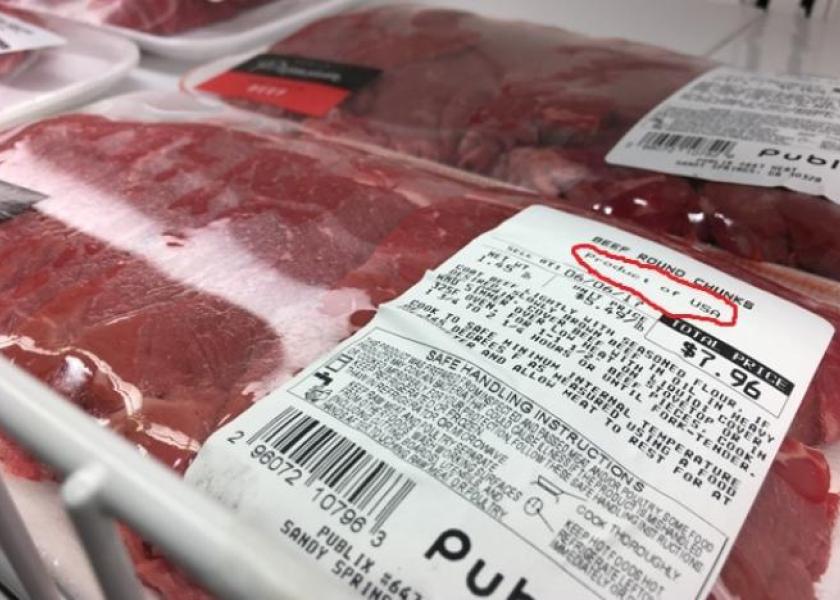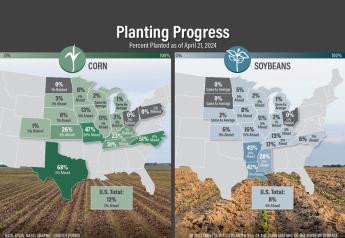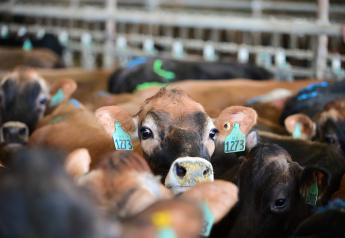COOL Finds New Hope in Freshmen Democrats

Country-of-origin labeling (COOL) has new life in Washington, D.C. That’s because 27 freshmen House Democrats sent a June 25 letter to Trade Representative Robert Lighthizer, and are urging the resurrection of COOL requirements as part of the U.S.-Mexico-Canada Agreement (USMCA). Those 27 House members say a vote on USMCA should not occur until the White House also includes strong enforcement provisions on labor and environment in the trade agreement.
Despite the newfound COOL support, analysts are calling the COOL resurrection a “long-shot.”
COOL was in effect from 2009 to 2015, requiring that beef and pork product labels cite where the animals were born, raised and slaughtered. Canada and Mexico challenged the law with the World Trade Organization, which ruled against the U.S. COOL regulations. Threatened with a combined $1.1 billion in annual retaliatory duties, the U.S. Congress repealed COOL in December 2015.
The letter from the Congress members stated: “Mexico and Canada already have used trade rules to undermine the food labeling that America’s farmers and ranchers support and the transparency that consumers demand. A final NAFTA package must restore the Country of Origin Labeling (COOL) passed by Congress and affirmed by U.S. courts.”
Austin Laufersweiler, spokesman for Rep. Andy Levin, one of the letter’s organizers, said the labeling provision was included “because it benefits workers, who are at the heart of the protections the freshmen are trying to have included.”
Among American groups pushing for reinstatement of COOL regulations are the National Farmers Union (NFU), Ranchers-Cattlemen Action Legal Fund (R-CALF), and the United States Cattlemen's Association (USCA). Groups opposing COOL are the North American Meat Institute (NAMI), the National Cattlemen’s Beef Association (NCBA), and the National Pork Producers Council (NPPC).
In a letter to Congressional leaders signed by 39 of its state affiliates, NCBA president President Jennifer Houston urged quick passage of USMCA, and also encouraged Congress to oppose renewed efforts to implement COOL.
“MCOOL was U.S. law for six years until it was repealed by Congress in 2015 to avoid $1 billion of retaliatory tariffs from Canada and Mexico that were sanctioned by the World Trade Organization (WTO),” the letter says. “The truth is MCOOL cost the U.S. beef industry hundreds of millions of dollars to implement, and the vast majority of consumers never paid attention to it. Our industry has suffered enough with this bad idea and we do not need to relive the sins of the past.”
Mexico has already approved USMCA, and it’s not immediately clear what impact the reintroduction of COOL would have on that approval. But Canadians have already voiced their opposition.
“While Canada respects that shoppers should be able to make informed decisions about the food they buy, mandatory COOL measures would place an undue burden on Canadian and American livestock supply chains, hurting producers on both sides of the border,” a spokesperson for the Canadian embassy in Washington wrote in an email to CQ Roll Call, a Washington D.C. news outlet that covers Congress.
Canada and Mexico objected to COOL because of the added cost burden it places on packers and retailers, and they claim U.S. buyers of cattle and hogs offered lower prices to Canadian or Mexican suppliers, or simply switched to U.S. suppliers.
In an April 2015 report, “Economic Analysis of Country of Origin Labeling (COOL),” USDA’s Office of the Chief Economist supported the idea such labeling laws remain costly and ineffective.
“The economic benefits of implementing the COOL regulations would be insufficient to offset the costs of the requirements whether analyzing the impacts through economic models of beef, pork, and poultry industries or of the U.S. economy as a whole,” the report said.
Regarding consumer interest, the report said, “USDA’s regulatory impact analyses concluded that while there is evidence of consumer interest in COOL information, measurable economic benefits from mandatory COOL would be small. USDA’s regulatory impact analyses also found little evidence that consumers would be likely to increase their purchases of food items bearing U.S.-origin labels.”
In terms of producers, packers and retailers, the report said “USDA’s regulatory impact analysis for the 2009 COOL rule estimated incremental implementation costs of $1.3 billion for beef, $300 million for pork, $183 million for chicken, and $2.6 billion for all covered commodities (beef, pork, chicken, lamb, goat, fish, fruits, vegetables, ginseng, peanuts, pecans, and macadamia nuts).”
Related stories:







